Organisational Behaviour Report: IHG Culture, Motivation, and Teams
VerifiedAdded on 2023/01/12
|14
|4428
|58
Report
AI Summary
This report provides an in-depth analysis of the organisational behaviour within Intercontinental Hotels & Resorts (IHG). It begins by exploring how organisational culture, encompassing aspects like power distance, individualism, uncertainty avoidance, and masculinity, influences individual and team performance. The report uses Hofstede's cultural dimensions to analyze IHG's culture. It then examines the impact of organisational power, specifically reward and coercive power, on employee behaviour. Furthermore, the report delves into motivation theories, comparing content theories (Maslow's hierarchy of needs and Herzberg's two-factor theory) with process theories. These theories are evaluated in the context of achieving organisational goals. Finally, the report discusses the characteristics of effective and ineffective teams within an organisational context, applying relevant concepts and philosophies of organisational behaviour to a given business situation at IHG.
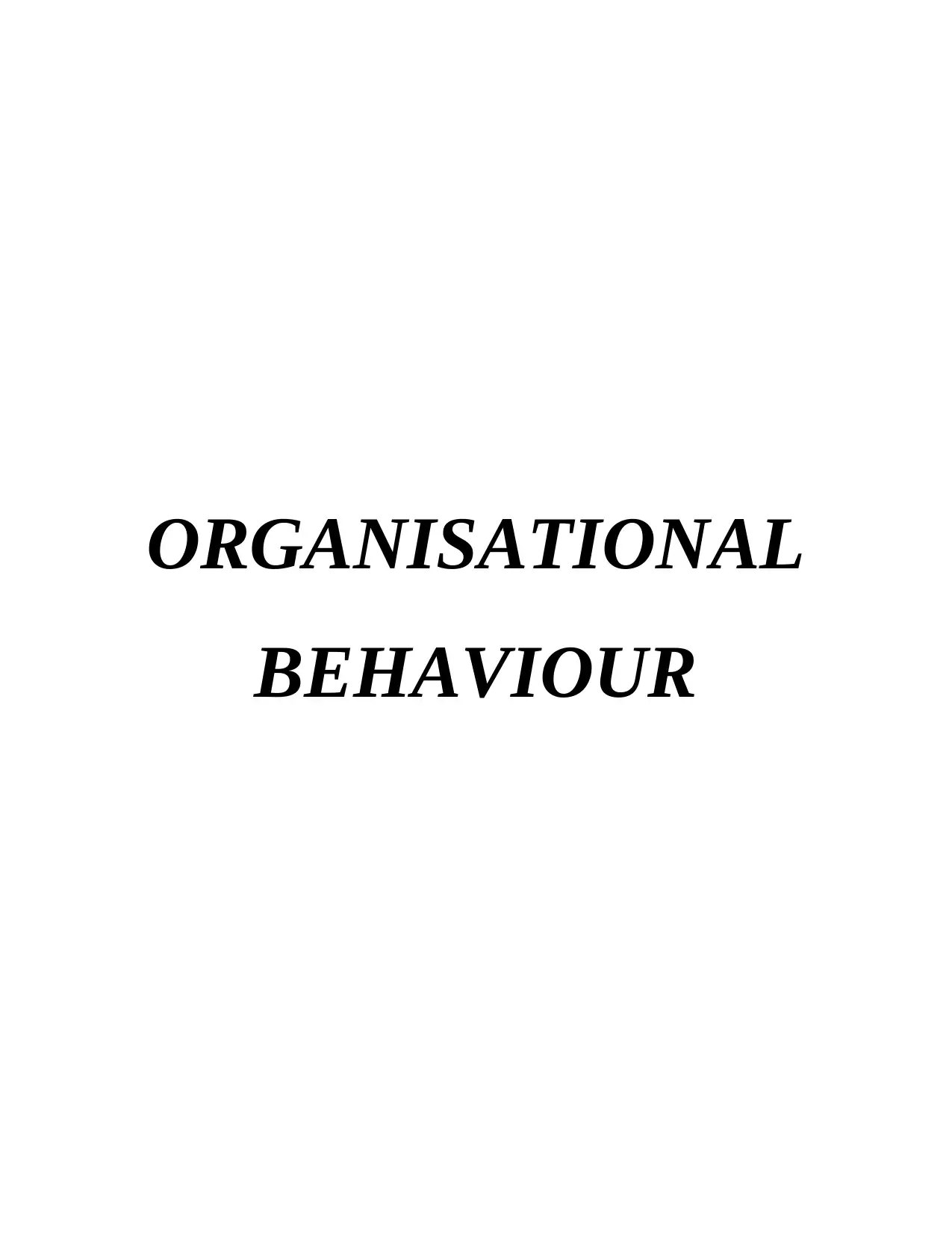
ORGANISATIONAL
BEHAVIOUR
BEHAVIOUR
Paraphrase This Document
Need a fresh take? Get an instant paraphrase of this document with our AI Paraphraser
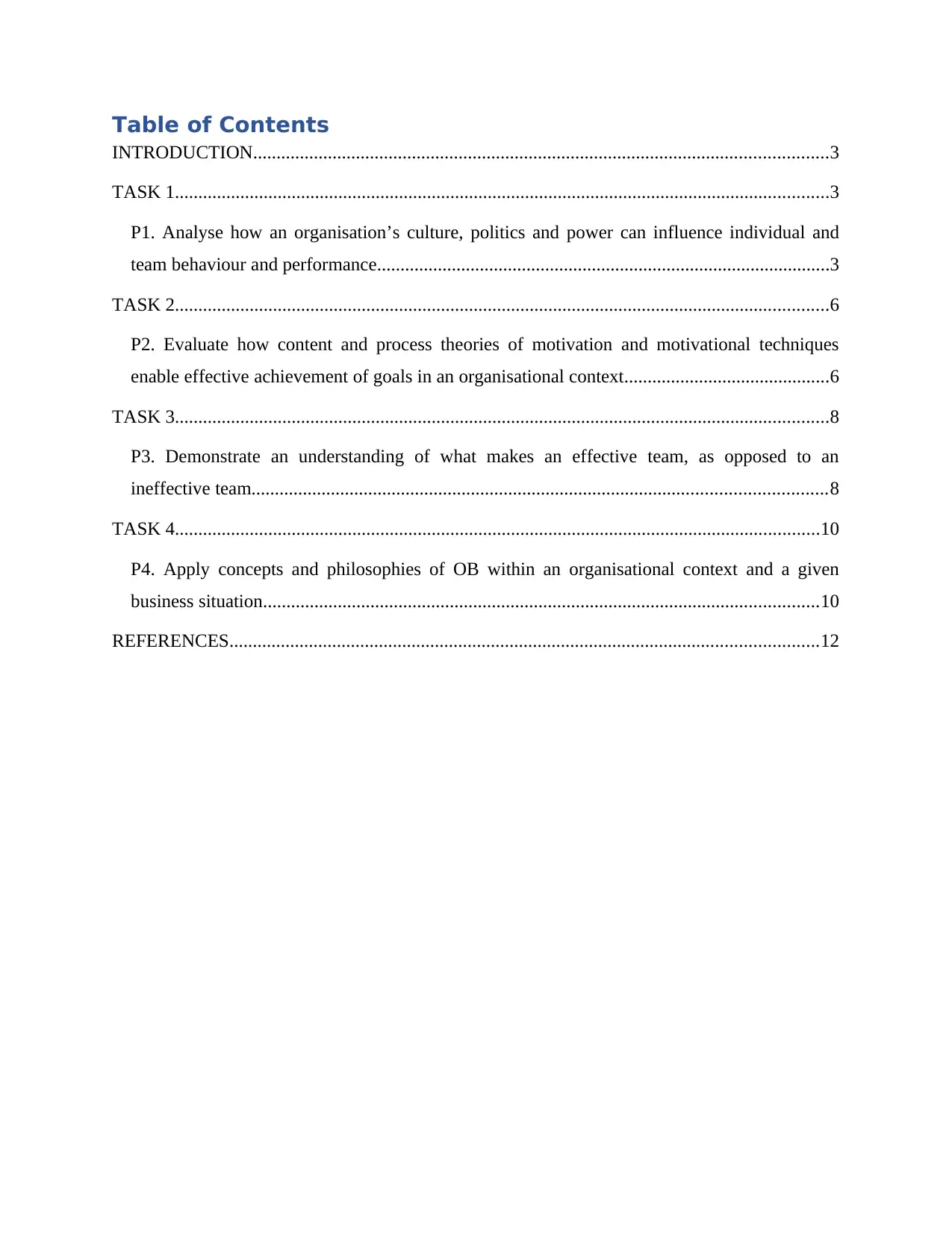
Table of Contents
INTRODUCTION...........................................................................................................................3
TASK 1............................................................................................................................................3
P1. Analyse how an organisation’s culture, politics and power can influence individual and
team behaviour and performance.................................................................................................3
TASK 2............................................................................................................................................6
P2. Evaluate how content and process theories of motivation and motivational techniques
enable effective achievement of goals in an organisational context............................................6
TASK 3............................................................................................................................................8
P3. Demonstrate an understanding of what makes an effective team, as opposed to an
ineffective team...........................................................................................................................8
TASK 4..........................................................................................................................................10
P4. Apply concepts and philosophies of OB within an organisational context and a given
business situation.......................................................................................................................10
REFERENCES..............................................................................................................................12
INTRODUCTION...........................................................................................................................3
TASK 1............................................................................................................................................3
P1. Analyse how an organisation’s culture, politics and power can influence individual and
team behaviour and performance.................................................................................................3
TASK 2............................................................................................................................................6
P2. Evaluate how content and process theories of motivation and motivational techniques
enable effective achievement of goals in an organisational context............................................6
TASK 3............................................................................................................................................8
P3. Demonstrate an understanding of what makes an effective team, as opposed to an
ineffective team...........................................................................................................................8
TASK 4..........................................................................................................................................10
P4. Apply concepts and philosophies of OB within an organisational context and a given
business situation.......................................................................................................................10
REFERENCES..............................................................................................................................12
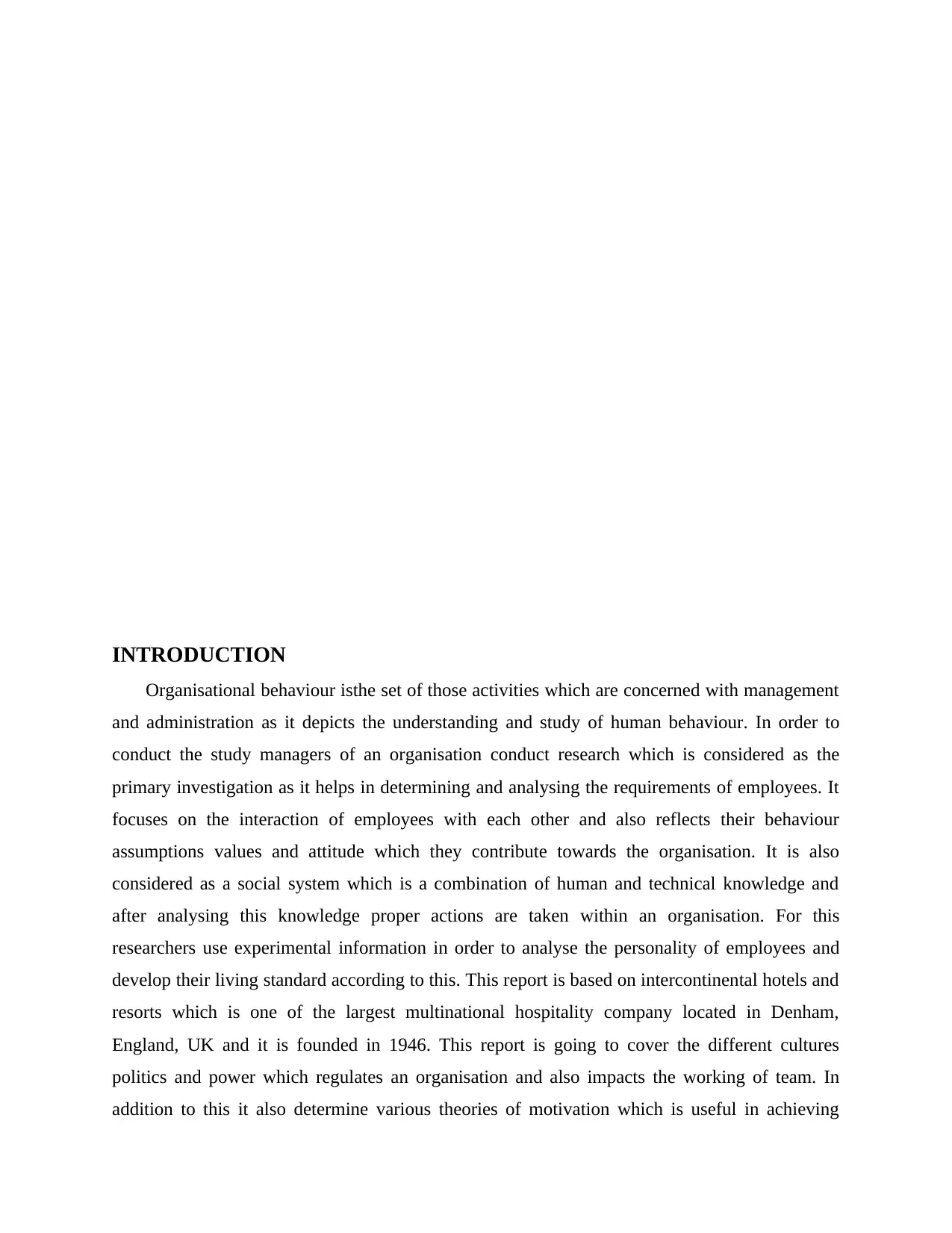
INTRODUCTION
Organisational behaviour isthe set of those activities which are concerned with management
and administration as it depicts the understanding and study of human behaviour. In order to
conduct the study managers of an organisation conduct research which is considered as the
primary investigation as it helps in determining and analysing the requirements of employees. It
focuses on the interaction of employees with each other and also reflects their behaviour
assumptions values and attitude which they contribute towards the organisation. It is also
considered as a social system which is a combination of human and technical knowledge and
after analysing this knowledge proper actions are taken within an organisation. For this
researchers use experimental information in order to analyse the personality of employees and
develop their living standard according to this. This report is based on intercontinental hotels and
resorts which is one of the largest multinational hospitality company located in Denham,
England, UK and it is founded in 1946. This report is going to cover the different cultures
politics and power which regulates an organisation and also impacts the working of team. In
addition to this it also determine various theories of motivation which is useful in achieving
Organisational behaviour isthe set of those activities which are concerned with management
and administration as it depicts the understanding and study of human behaviour. In order to
conduct the study managers of an organisation conduct research which is considered as the
primary investigation as it helps in determining and analysing the requirements of employees. It
focuses on the interaction of employees with each other and also reflects their behaviour
assumptions values and attitude which they contribute towards the organisation. It is also
considered as a social system which is a combination of human and technical knowledge and
after analysing this knowledge proper actions are taken within an organisation. For this
researchers use experimental information in order to analyse the personality of employees and
develop their living standard according to this. This report is based on intercontinental hotels and
resorts which is one of the largest multinational hospitality company located in Denham,
England, UK and it is founded in 1946. This report is going to cover the different cultures
politics and power which regulates an organisation and also impacts the working of team. In
addition to this it also determine various theories of motivation which is useful in achieving
⊘ This is a preview!⊘
Do you want full access?
Subscribe today to unlock all pages.

Trusted by 1+ million students worldwide
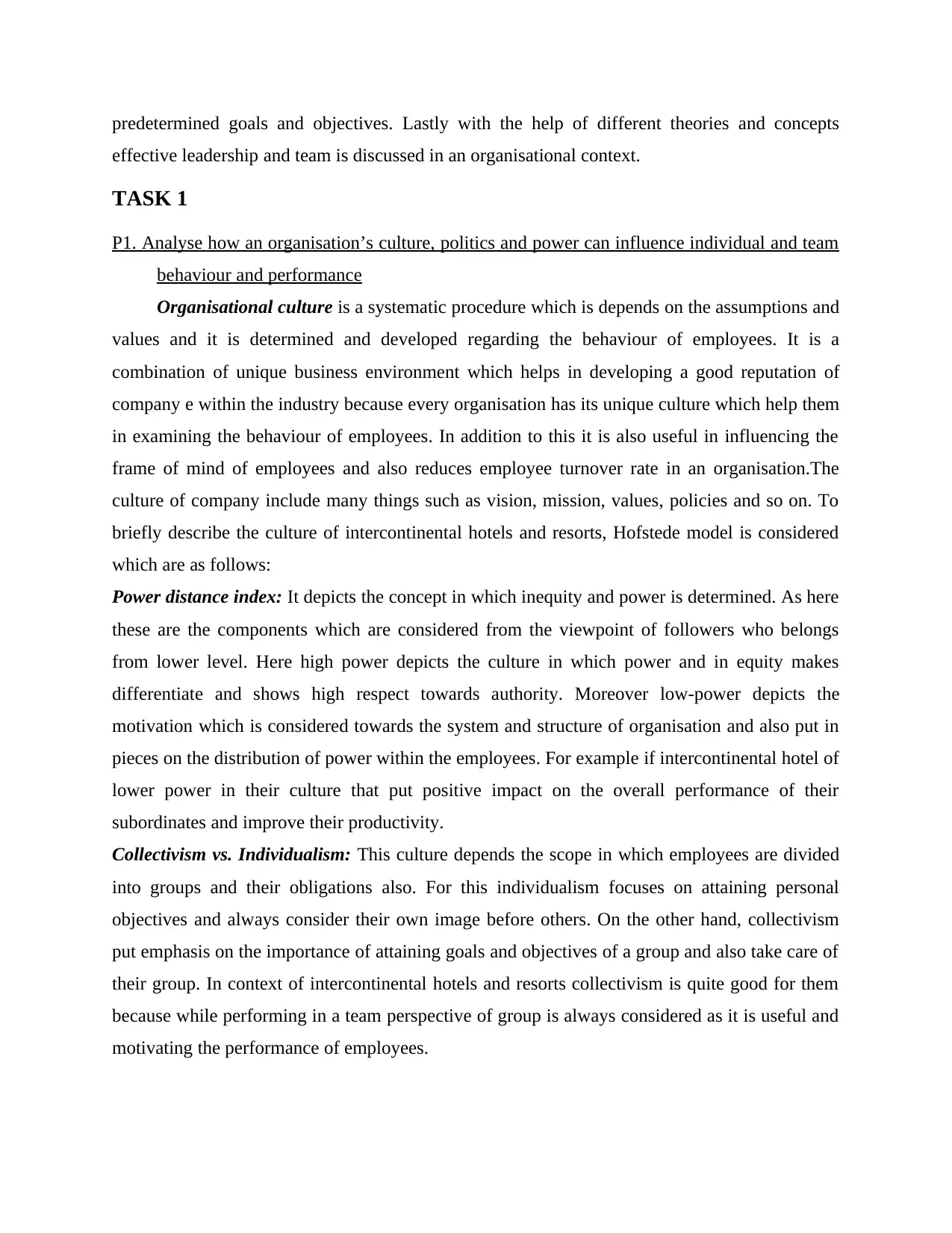
predetermined goals and objectives. Lastly with the help of different theories and concepts
effective leadership and team is discussed in an organisational context.
TASK 1
P1. Analyse how an organisation’s culture, politics and power can influence individual and team
behaviour and performance
Organisational culture is a systematic procedure which is depends on the assumptions and
values and it is determined and developed regarding the behaviour of employees. It is a
combination of unique business environment which helps in developing a good reputation of
company e within the industry because every organisation has its unique culture which help them
in examining the behaviour of employees. In addition to this it is also useful in influencing the
frame of mind of employees and also reduces employee turnover rate in an organisation.The
culture of company include many things such as vision, mission, values, policies and so on. To
briefly describe the culture of intercontinental hotels and resorts, Hofstede model is considered
which are as follows:
Power distance index: It depicts the concept in which inequity and power is determined. As here
these are the components which are considered from the viewpoint of followers who belongs
from lower level. Here high power depicts the culture in which power and in equity makes
differentiate and shows high respect towards authority. Moreover low-power depicts the
motivation which is considered towards the system and structure of organisation and also put in
pieces on the distribution of power within the employees. For example if intercontinental hotel of
lower power in their culture that put positive impact on the overall performance of their
subordinates and improve their productivity.
Collectivism vs. Individualism: This culture depends the scope in which employees are divided
into groups and their obligations also. For this individualism focuses on attaining personal
objectives and always consider their own image before others. On the other hand, collectivism
put emphasis on the importance of attaining goals and objectives of a group and also take care of
their group. In context of intercontinental hotels and resorts collectivism is quite good for them
because while performing in a team perspective of group is always considered as it is useful and
motivating the performance of employees.
effective leadership and team is discussed in an organisational context.
TASK 1
P1. Analyse how an organisation’s culture, politics and power can influence individual and team
behaviour and performance
Organisational culture is a systematic procedure which is depends on the assumptions and
values and it is determined and developed regarding the behaviour of employees. It is a
combination of unique business environment which helps in developing a good reputation of
company e within the industry because every organisation has its unique culture which help them
in examining the behaviour of employees. In addition to this it is also useful in influencing the
frame of mind of employees and also reduces employee turnover rate in an organisation.The
culture of company include many things such as vision, mission, values, policies and so on. To
briefly describe the culture of intercontinental hotels and resorts, Hofstede model is considered
which are as follows:
Power distance index: It depicts the concept in which inequity and power is determined. As here
these are the components which are considered from the viewpoint of followers who belongs
from lower level. Here high power depicts the culture in which power and in equity makes
differentiate and shows high respect towards authority. Moreover low-power depicts the
motivation which is considered towards the system and structure of organisation and also put in
pieces on the distribution of power within the employees. For example if intercontinental hotel of
lower power in their culture that put positive impact on the overall performance of their
subordinates and improve their productivity.
Collectivism vs. Individualism: This culture depends the scope in which employees are divided
into groups and their obligations also. For this individualism focuses on attaining personal
objectives and always consider their own image before others. On the other hand, collectivism
put emphasis on the importance of attaining goals and objectives of a group and also take care of
their group. In context of intercontinental hotels and resorts collectivism is quite good for them
because while performing in a team perspective of group is always considered as it is useful and
motivating the performance of employees.
Paraphrase This Document
Need a fresh take? Get an instant paraphrase of this document with our AI Paraphraser
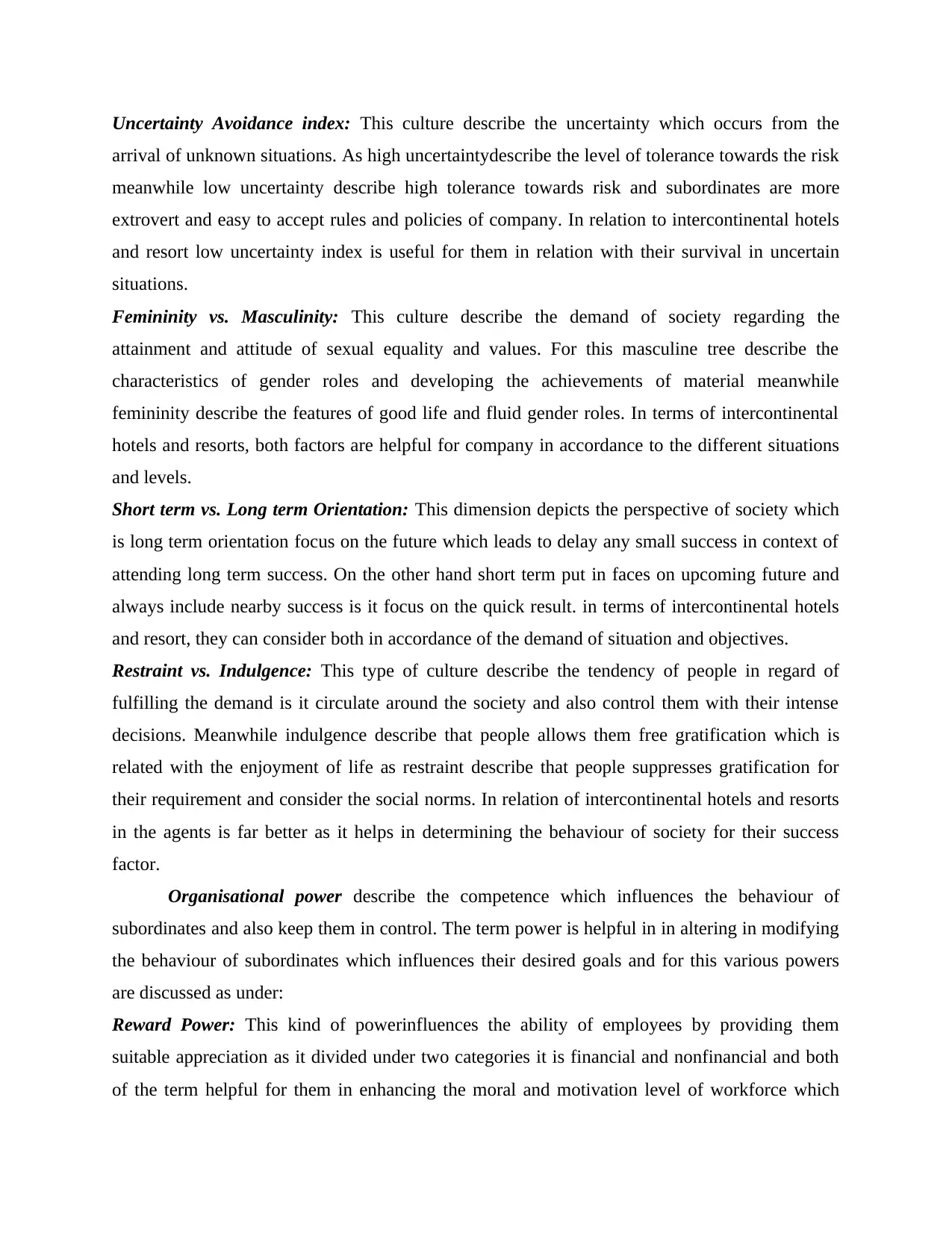
Uncertainty Avoidance index: This culture describe the uncertainty which occurs from the
arrival of unknown situations. As high uncertaintydescribe the level of tolerance towards the risk
meanwhile low uncertainty describe high tolerance towards risk and subordinates are more
extrovert and easy to accept rules and policies of company. In relation to intercontinental hotels
and resort low uncertainty index is useful for them in relation with their survival in uncertain
situations.
Femininity vs. Masculinity: This culture describe the demand of society regarding the
attainment and attitude of sexual equality and values. For this masculine tree describe the
characteristics of gender roles and developing the achievements of material meanwhile
femininity describe the features of good life and fluid gender roles. In terms of intercontinental
hotels and resorts, both factors are helpful for company in accordance to the different situations
and levels.
Short term vs. Long term Orientation: This dimension depicts the perspective of society which
is long term orientation focus on the future which leads to delay any small success in context of
attending long term success. On the other hand short term put in faces on upcoming future and
always include nearby success is it focus on the quick result. in terms of intercontinental hotels
and resort, they can consider both in accordance of the demand of situation and objectives.
Restraint vs. Indulgence: This type of culture describe the tendency of people in regard of
fulfilling the demand is it circulate around the society and also control them with their intense
decisions. Meanwhile indulgence describe that people allows them free gratification which is
related with the enjoyment of life as restraint describe that people suppresses gratification for
their requirement and consider the social norms. In relation of intercontinental hotels and resorts
in the agents is far better as it helps in determining the behaviour of society for their success
factor.
Organisational power describe the competence which influences the behaviour of
subordinates and also keep them in control. The term power is helpful in in altering in modifying
the behaviour of subordinates which influences their desired goals and for this various powers
are discussed as under:
Reward Power: This kind of powerinfluences the ability of employees by providing them
suitable appreciation as it divided under two categories it is financial and nonfinancial and both
of the term helpful for them in enhancing the moral and motivation level of workforce which
arrival of unknown situations. As high uncertaintydescribe the level of tolerance towards the risk
meanwhile low uncertainty describe high tolerance towards risk and subordinates are more
extrovert and easy to accept rules and policies of company. In relation to intercontinental hotels
and resort low uncertainty index is useful for them in relation with their survival in uncertain
situations.
Femininity vs. Masculinity: This culture describe the demand of society regarding the
attainment and attitude of sexual equality and values. For this masculine tree describe the
characteristics of gender roles and developing the achievements of material meanwhile
femininity describe the features of good life and fluid gender roles. In terms of intercontinental
hotels and resorts, both factors are helpful for company in accordance to the different situations
and levels.
Short term vs. Long term Orientation: This dimension depicts the perspective of society which
is long term orientation focus on the future which leads to delay any small success in context of
attending long term success. On the other hand short term put in faces on upcoming future and
always include nearby success is it focus on the quick result. in terms of intercontinental hotels
and resort, they can consider both in accordance of the demand of situation and objectives.
Restraint vs. Indulgence: This type of culture describe the tendency of people in regard of
fulfilling the demand is it circulate around the society and also control them with their intense
decisions. Meanwhile indulgence describe that people allows them free gratification which is
related with the enjoyment of life as restraint describe that people suppresses gratification for
their requirement and consider the social norms. In relation of intercontinental hotels and resorts
in the agents is far better as it helps in determining the behaviour of society for their success
factor.
Organisational power describe the competence which influences the behaviour of
subordinates and also keep them in control. The term power is helpful in in altering in modifying
the behaviour of subordinates which influences their desired goals and for this various powers
are discussed as under:
Reward Power: This kind of powerinfluences the ability of employees by providing them
suitable appreciation as it divided under two categories it is financial and nonfinancial and both
of the term helpful for them in enhancing the moral and motivation level of workforce which
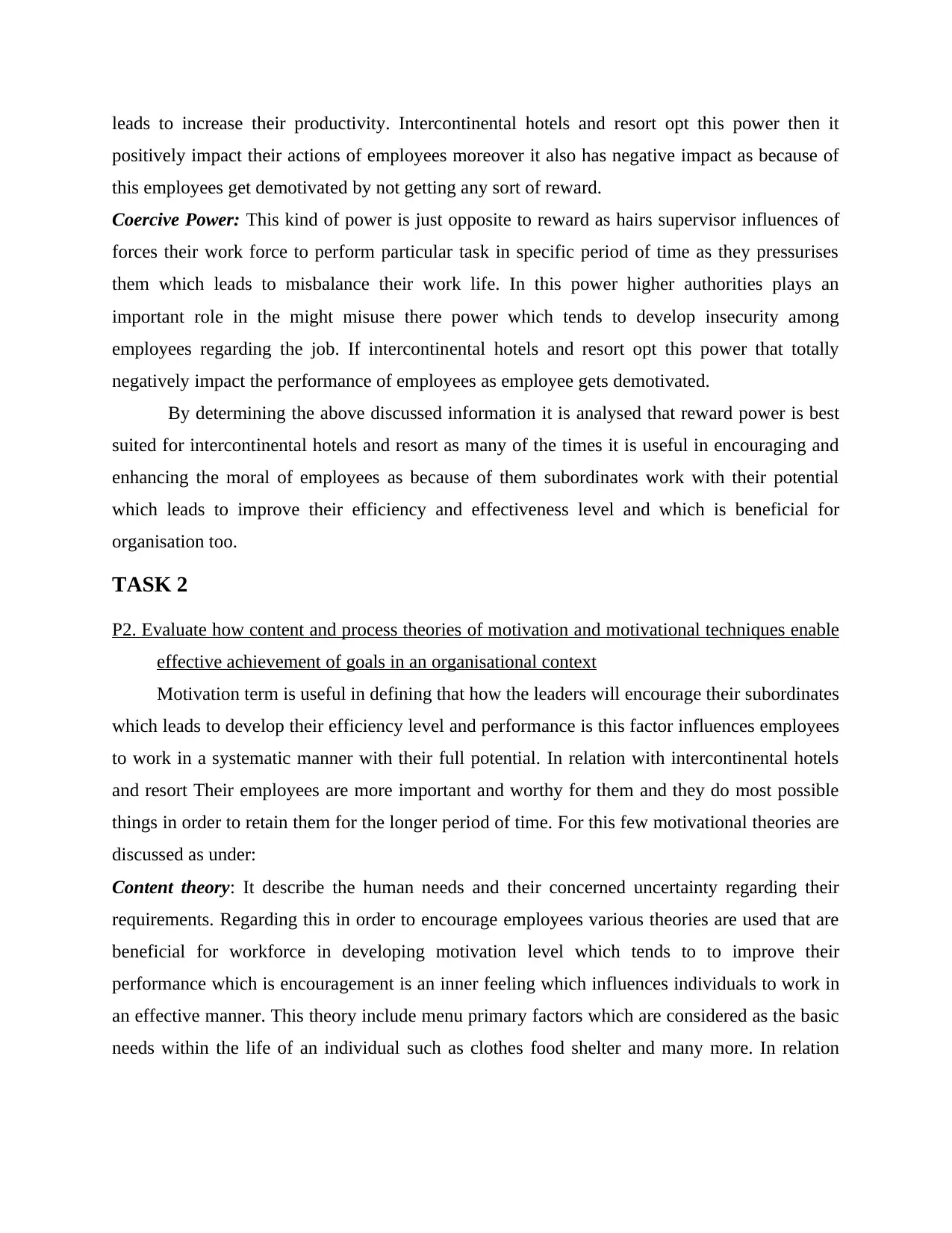
leads to increase their productivity. Intercontinental hotels and resort opt this power then it
positively impact their actions of employees moreover it also has negative impact as because of
this employees get demotivated by not getting any sort of reward.
Coercive Power: This kind of power is just opposite to reward as hairs supervisor influences of
forces their work force to perform particular task in specific period of time as they pressurises
them which leads to misbalance their work life. In this power higher authorities plays an
important role in the might misuse there power which tends to develop insecurity among
employees regarding the job. If intercontinental hotels and resort opt this power that totally
negatively impact the performance of employees as employee gets demotivated.
By determining the above discussed information it is analysed that reward power is best
suited for intercontinental hotels and resort as many of the times it is useful in encouraging and
enhancing the moral of employees as because of them subordinates work with their potential
which leads to improve their efficiency and effectiveness level and which is beneficial for
organisation too.
TASK 2
P2. Evaluate how content and process theories of motivation and motivational techniques enable
effective achievement of goals in an organisational context
Motivation term is useful in defining that how the leaders will encourage their subordinates
which leads to develop their efficiency level and performance is this factor influences employees
to work in a systematic manner with their full potential. In relation with intercontinental hotels
and resort Their employees are more important and worthy for them and they do most possible
things in order to retain them for the longer period of time. For this few motivational theories are
discussed as under:
Content theory: It describe the human needs and their concerned uncertainty regarding their
requirements. Regarding this in order to encourage employees various theories are used that are
beneficial for workforce in developing motivation level which tends to to improve their
performance which is encouragement is an inner feeling which influences individuals to work in
an effective manner. This theory include menu primary factors which are considered as the basic
needs within the life of an individual such as clothes food shelter and many more. In relation
positively impact their actions of employees moreover it also has negative impact as because of
this employees get demotivated by not getting any sort of reward.
Coercive Power: This kind of power is just opposite to reward as hairs supervisor influences of
forces their work force to perform particular task in specific period of time as they pressurises
them which leads to misbalance their work life. In this power higher authorities plays an
important role in the might misuse there power which tends to develop insecurity among
employees regarding the job. If intercontinental hotels and resort opt this power that totally
negatively impact the performance of employees as employee gets demotivated.
By determining the above discussed information it is analysed that reward power is best
suited for intercontinental hotels and resort as many of the times it is useful in encouraging and
enhancing the moral of employees as because of them subordinates work with their potential
which leads to improve their efficiency and effectiveness level and which is beneficial for
organisation too.
TASK 2
P2. Evaluate how content and process theories of motivation and motivational techniques enable
effective achievement of goals in an organisational context
Motivation term is useful in defining that how the leaders will encourage their subordinates
which leads to develop their efficiency level and performance is this factor influences employees
to work in a systematic manner with their full potential. In relation with intercontinental hotels
and resort Their employees are more important and worthy for them and they do most possible
things in order to retain them for the longer period of time. For this few motivational theories are
discussed as under:
Content theory: It describe the human needs and their concerned uncertainty regarding their
requirements. Regarding this in order to encourage employees various theories are used that are
beneficial for workforce in developing motivation level which tends to to improve their
performance which is encouragement is an inner feeling which influences individuals to work in
an effective manner. This theory include menu primary factors which are considered as the basic
needs within the life of an individual such as clothes food shelter and many more. In relation
⊘ This is a preview!⊘
Do you want full access?
Subscribe today to unlock all pages.

Trusted by 1+ million students worldwide
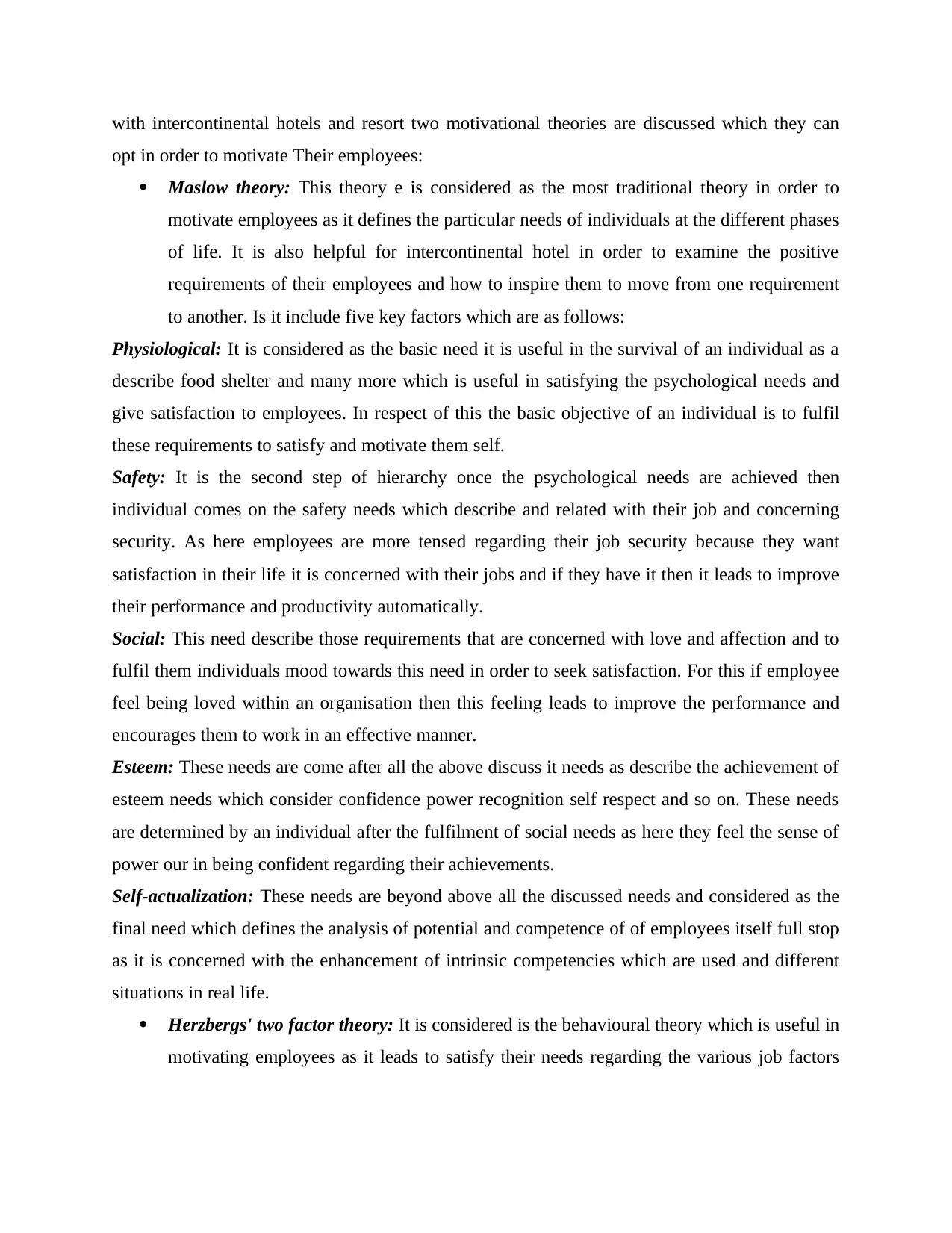
with intercontinental hotels and resort two motivational theories are discussed which they can
opt in order to motivate Their employees:
Maslow theory: This theory e is considered as the most traditional theory in order to
motivate employees as it defines the particular needs of individuals at the different phases
of life. It is also helpful for intercontinental hotel in order to examine the positive
requirements of their employees and how to inspire them to move from one requirement
to another. Is it include five key factors which are as follows:
Physiological: It is considered as the basic need it is useful in the survival of an individual as a
describe food shelter and many more which is useful in satisfying the psychological needs and
give satisfaction to employees. In respect of this the basic objective of an individual is to fulfil
these requirements to satisfy and motivate them self.
Safety: It is the second step of hierarchy once the psychological needs are achieved then
individual comes on the safety needs which describe and related with their job and concerning
security. As here employees are more tensed regarding their job security because they want
satisfaction in their life it is concerned with their jobs and if they have it then it leads to improve
their performance and productivity automatically.
Social: This need describe those requirements that are concerned with love and affection and to
fulfil them individuals mood towards this need in order to seek satisfaction. For this if employee
feel being loved within an organisation then this feeling leads to improve the performance and
encourages them to work in an effective manner.
Esteem: These needs are come after all the above discuss it needs as describe the achievement of
esteem needs which consider confidence power recognition self respect and so on. These needs
are determined by an individual after the fulfilment of social needs as here they feel the sense of
power our in being confident regarding their achievements.
Self-actualization: These needs are beyond above all the discussed needs and considered as the
final need which defines the analysis of potential and competence of of employees itself full stop
as it is concerned with the enhancement of intrinsic competencies which are used and different
situations in real life.
Herzbergs' two factor theory: It is considered is the behavioural theory which is useful in
motivating employees as it leads to satisfy their needs regarding the various job factors
opt in order to motivate Their employees:
Maslow theory: This theory e is considered as the most traditional theory in order to
motivate employees as it defines the particular needs of individuals at the different phases
of life. It is also helpful for intercontinental hotel in order to examine the positive
requirements of their employees and how to inspire them to move from one requirement
to another. Is it include five key factors which are as follows:
Physiological: It is considered as the basic need it is useful in the survival of an individual as a
describe food shelter and many more which is useful in satisfying the psychological needs and
give satisfaction to employees. In respect of this the basic objective of an individual is to fulfil
these requirements to satisfy and motivate them self.
Safety: It is the second step of hierarchy once the psychological needs are achieved then
individual comes on the safety needs which describe and related with their job and concerning
security. As here employees are more tensed regarding their job security because they want
satisfaction in their life it is concerned with their jobs and if they have it then it leads to improve
their performance and productivity automatically.
Social: This need describe those requirements that are concerned with love and affection and to
fulfil them individuals mood towards this need in order to seek satisfaction. For this if employee
feel being loved within an organisation then this feeling leads to improve the performance and
encourages them to work in an effective manner.
Esteem: These needs are come after all the above discuss it needs as describe the achievement of
esteem needs which consider confidence power recognition self respect and so on. These needs
are determined by an individual after the fulfilment of social needs as here they feel the sense of
power our in being confident regarding their achievements.
Self-actualization: These needs are beyond above all the discussed needs and considered as the
final need which defines the analysis of potential and competence of of employees itself full stop
as it is concerned with the enhancement of intrinsic competencies which are used and different
situations in real life.
Herzbergs' two factor theory: It is considered is the behavioural theory which is useful in
motivating employees as it leads to satisfy their needs regarding the various job factors
Paraphrase This Document
Need a fresh take? Get an instant paraphrase of this document with our AI Paraphraser
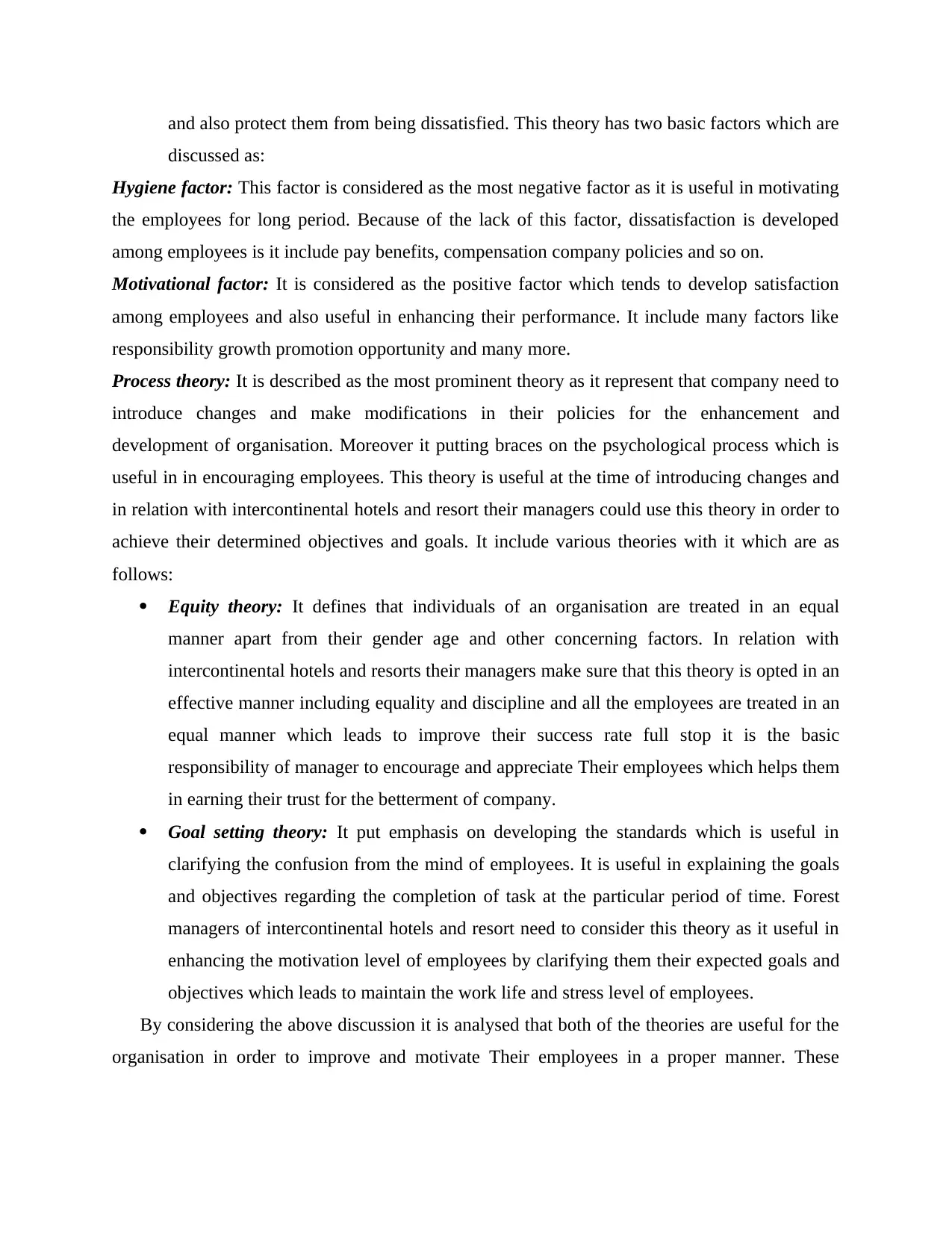
and also protect them from being dissatisfied. This theory has two basic factors which are
discussed as:
Hygiene factor: This factor is considered as the most negative factor as it is useful in motivating
the employees for long period. Because of the lack of this factor, dissatisfaction is developed
among employees is it include pay benefits, compensation company policies and so on.
Motivational factor: It is considered as the positive factor which tends to develop satisfaction
among employees and also useful in enhancing their performance. It include many factors like
responsibility growth promotion opportunity and many more.
Process theory: It is described as the most prominent theory as it represent that company need to
introduce changes and make modifications in their policies for the enhancement and
development of organisation. Moreover it putting braces on the psychological process which is
useful in in encouraging employees. This theory is useful at the time of introducing changes and
in relation with intercontinental hotels and resort their managers could use this theory in order to
achieve their determined objectives and goals. It include various theories with it which are as
follows:
Equity theory: It defines that individuals of an organisation are treated in an equal
manner apart from their gender age and other concerning factors. In relation with
intercontinental hotels and resorts their managers make sure that this theory is opted in an
effective manner including equality and discipline and all the employees are treated in an
equal manner which leads to improve their success rate full stop it is the basic
responsibility of manager to encourage and appreciate Their employees which helps them
in earning their trust for the betterment of company.
Goal setting theory: It put emphasis on developing the standards which is useful in
clarifying the confusion from the mind of employees. It is useful in explaining the goals
and objectives regarding the completion of task at the particular period of time. Forest
managers of intercontinental hotels and resort need to consider this theory as it useful in
enhancing the motivation level of employees by clarifying them their expected goals and
objectives which leads to maintain the work life and stress level of employees.
By considering the above discussion it is analysed that both of the theories are useful for the
organisation in order to improve and motivate Their employees in a proper manner. These
discussed as:
Hygiene factor: This factor is considered as the most negative factor as it is useful in motivating
the employees for long period. Because of the lack of this factor, dissatisfaction is developed
among employees is it include pay benefits, compensation company policies and so on.
Motivational factor: It is considered as the positive factor which tends to develop satisfaction
among employees and also useful in enhancing their performance. It include many factors like
responsibility growth promotion opportunity and many more.
Process theory: It is described as the most prominent theory as it represent that company need to
introduce changes and make modifications in their policies for the enhancement and
development of organisation. Moreover it putting braces on the psychological process which is
useful in in encouraging employees. This theory is useful at the time of introducing changes and
in relation with intercontinental hotels and resort their managers could use this theory in order to
achieve their determined objectives and goals. It include various theories with it which are as
follows:
Equity theory: It defines that individuals of an organisation are treated in an equal
manner apart from their gender age and other concerning factors. In relation with
intercontinental hotels and resorts their managers make sure that this theory is opted in an
effective manner including equality and discipline and all the employees are treated in an
equal manner which leads to improve their success rate full stop it is the basic
responsibility of manager to encourage and appreciate Their employees which helps them
in earning their trust for the betterment of company.
Goal setting theory: It put emphasis on developing the standards which is useful in
clarifying the confusion from the mind of employees. It is useful in explaining the goals
and objectives regarding the completion of task at the particular period of time. Forest
managers of intercontinental hotels and resort need to consider this theory as it useful in
enhancing the motivation level of employees by clarifying them their expected goals and
objectives which leads to maintain the work life and stress level of employees.
By considering the above discussion it is analysed that both of the theories are useful for the
organisation in order to improve and motivate Their employees in a proper manner. These
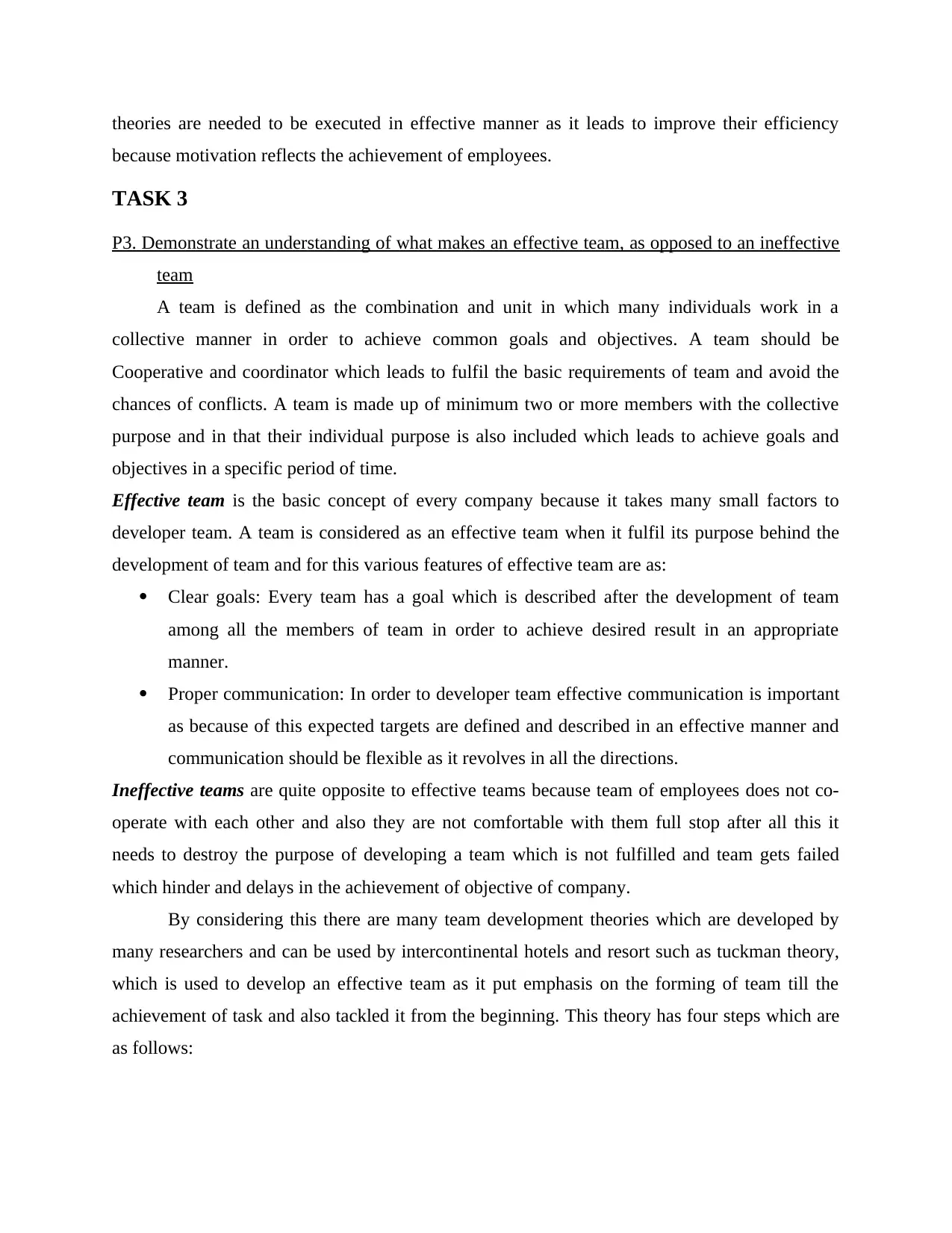
theories are needed to be executed in effective manner as it leads to improve their efficiency
because motivation reflects the achievement of employees.
TASK 3
P3. Demonstrate an understanding of what makes an effective team, as opposed to an ineffective
team
A team is defined as the combination and unit in which many individuals work in a
collective manner in order to achieve common goals and objectives. A team should be
Cooperative and coordinator which leads to fulfil the basic requirements of team and avoid the
chances of conflicts. A team is made up of minimum two or more members with the collective
purpose and in that their individual purpose is also included which leads to achieve goals and
objectives in a specific period of time.
Effective team is the basic concept of every company because it takes many small factors to
developer team. A team is considered as an effective team when it fulfil its purpose behind the
development of team and for this various features of effective team are as:
Clear goals: Every team has a goal which is described after the development of team
among all the members of team in order to achieve desired result in an appropriate
manner.
Proper communication: In order to developer team effective communication is important
as because of this expected targets are defined and described in an effective manner and
communication should be flexible as it revolves in all the directions.
Ineffective teams are quite opposite to effective teams because team of employees does not co-
operate with each other and also they are not comfortable with them full stop after all this it
needs to destroy the purpose of developing a team which is not fulfilled and team gets failed
which hinder and delays in the achievement of objective of company.
By considering this there are many team development theories which are developed by
many researchers and can be used by intercontinental hotels and resort such as tuckman theory,
which is used to develop an effective team as it put emphasis on the forming of team till the
achievement of task and also tackled it from the beginning. This theory has four steps which are
as follows:
because motivation reflects the achievement of employees.
TASK 3
P3. Demonstrate an understanding of what makes an effective team, as opposed to an ineffective
team
A team is defined as the combination and unit in which many individuals work in a
collective manner in order to achieve common goals and objectives. A team should be
Cooperative and coordinator which leads to fulfil the basic requirements of team and avoid the
chances of conflicts. A team is made up of minimum two or more members with the collective
purpose and in that their individual purpose is also included which leads to achieve goals and
objectives in a specific period of time.
Effective team is the basic concept of every company because it takes many small factors to
developer team. A team is considered as an effective team when it fulfil its purpose behind the
development of team and for this various features of effective team are as:
Clear goals: Every team has a goal which is described after the development of team
among all the members of team in order to achieve desired result in an appropriate
manner.
Proper communication: In order to developer team effective communication is important
as because of this expected targets are defined and described in an effective manner and
communication should be flexible as it revolves in all the directions.
Ineffective teams are quite opposite to effective teams because team of employees does not co-
operate with each other and also they are not comfortable with them full stop after all this it
needs to destroy the purpose of developing a team which is not fulfilled and team gets failed
which hinder and delays in the achievement of objective of company.
By considering this there are many team development theories which are developed by
many researchers and can be used by intercontinental hotels and resort such as tuckman theory,
which is used to develop an effective team as it put emphasis on the forming of team till the
achievement of task and also tackled it from the beginning. This theory has four steps which are
as follows:
⊘ This is a preview!⊘
Do you want full access?
Subscribe today to unlock all pages.

Trusted by 1+ million students worldwide
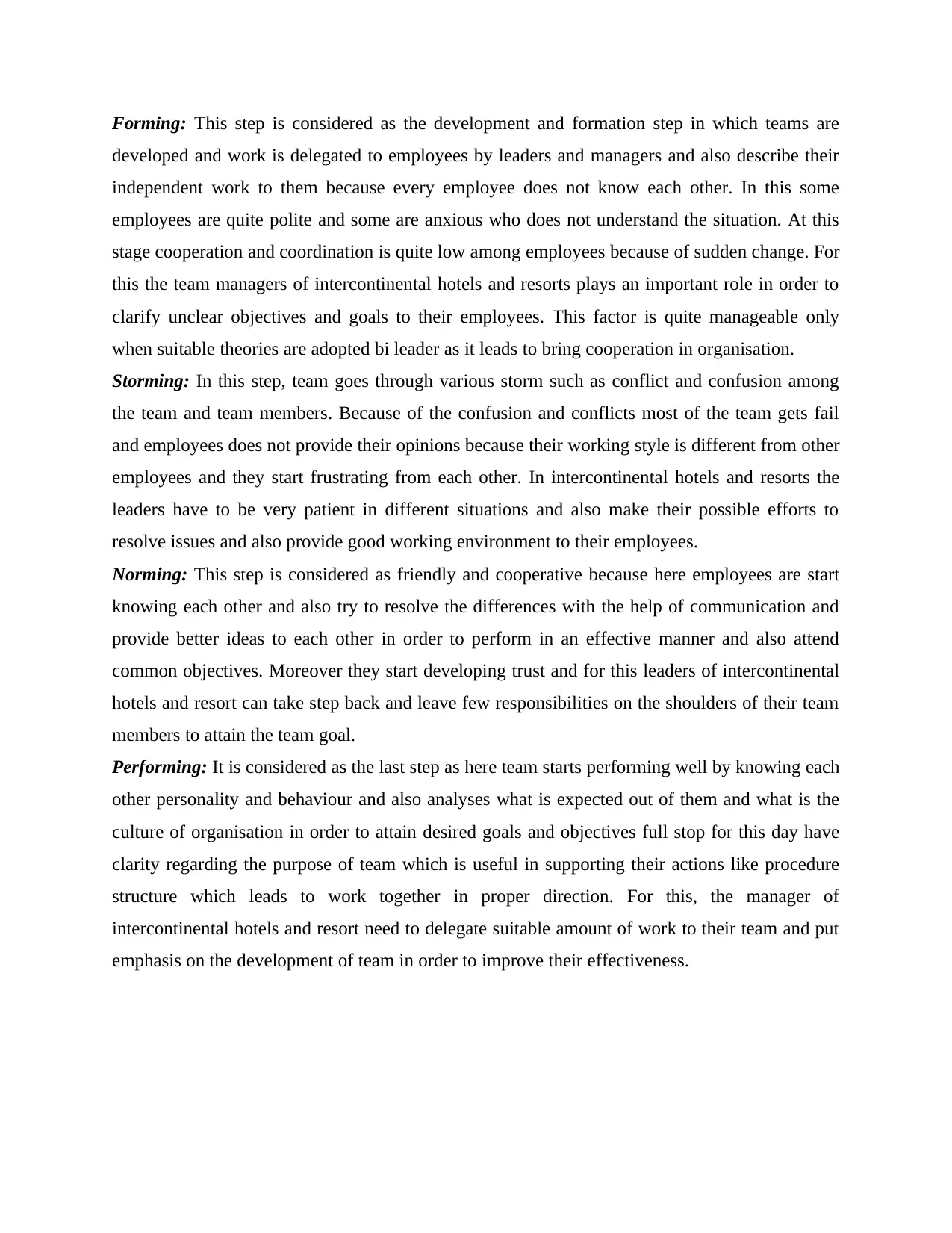
Forming: This step is considered as the development and formation step in which teams are
developed and work is delegated to employees by leaders and managers and also describe their
independent work to them because every employee does not know each other. In this some
employees are quite polite and some are anxious who does not understand the situation. At this
stage cooperation and coordination is quite low among employees because of sudden change. For
this the team managers of intercontinental hotels and resorts plays an important role in order to
clarify unclear objectives and goals to their employees. This factor is quite manageable only
when suitable theories are adopted bi leader as it leads to bring cooperation in organisation.
Storming: In this step, team goes through various storm such as conflict and confusion among
the team and team members. Because of the confusion and conflicts most of the team gets fail
and employees does not provide their opinions because their working style is different from other
employees and they start frustrating from each other. In intercontinental hotels and resorts the
leaders have to be very patient in different situations and also make their possible efforts to
resolve issues and also provide good working environment to their employees.
Norming: This step is considered as friendly and cooperative because here employees are start
knowing each other and also try to resolve the differences with the help of communication and
provide better ideas to each other in order to perform in an effective manner and also attend
common objectives. Moreover they start developing trust and for this leaders of intercontinental
hotels and resort can take step back and leave few responsibilities on the shoulders of their team
members to attain the team goal.
Performing: It is considered as the last step as here team starts performing well by knowing each
other personality and behaviour and also analyses what is expected out of them and what is the
culture of organisation in order to attain desired goals and objectives full stop for this day have
clarity regarding the purpose of team which is useful in supporting their actions like procedure
structure which leads to work together in proper direction. For this, the manager of
intercontinental hotels and resort need to delegate suitable amount of work to their team and put
emphasis on the development of team in order to improve their effectiveness.
developed and work is delegated to employees by leaders and managers and also describe their
independent work to them because every employee does not know each other. In this some
employees are quite polite and some are anxious who does not understand the situation. At this
stage cooperation and coordination is quite low among employees because of sudden change. For
this the team managers of intercontinental hotels and resorts plays an important role in order to
clarify unclear objectives and goals to their employees. This factor is quite manageable only
when suitable theories are adopted bi leader as it leads to bring cooperation in organisation.
Storming: In this step, team goes through various storm such as conflict and confusion among
the team and team members. Because of the confusion and conflicts most of the team gets fail
and employees does not provide their opinions because their working style is different from other
employees and they start frustrating from each other. In intercontinental hotels and resorts the
leaders have to be very patient in different situations and also make their possible efforts to
resolve issues and also provide good working environment to their employees.
Norming: This step is considered as friendly and cooperative because here employees are start
knowing each other and also try to resolve the differences with the help of communication and
provide better ideas to each other in order to perform in an effective manner and also attend
common objectives. Moreover they start developing trust and for this leaders of intercontinental
hotels and resort can take step back and leave few responsibilities on the shoulders of their team
members to attain the team goal.
Performing: It is considered as the last step as here team starts performing well by knowing each
other personality and behaviour and also analyses what is expected out of them and what is the
culture of organisation in order to attain desired goals and objectives full stop for this day have
clarity regarding the purpose of team which is useful in supporting their actions like procedure
structure which leads to work together in proper direction. For this, the manager of
intercontinental hotels and resort need to delegate suitable amount of work to their team and put
emphasis on the development of team in order to improve their effectiveness.
Paraphrase This Document
Need a fresh take? Get an instant paraphrase of this document with our AI Paraphraser
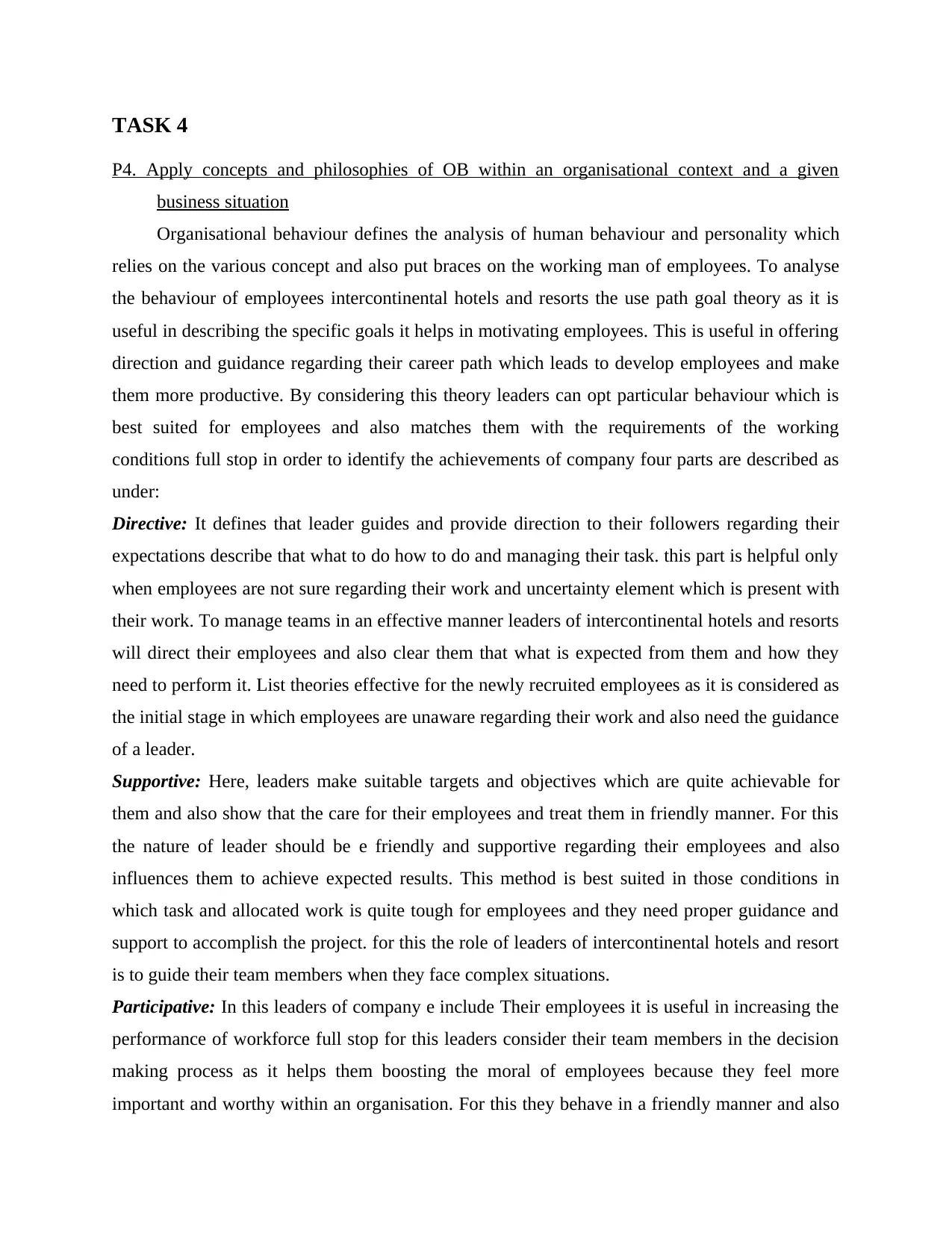
TASK 4
P4. Apply concepts and philosophies of OB within an organisational context and a given
business situation
Organisational behaviour defines the analysis of human behaviour and personality which
relies on the various concept and also put braces on the working man of employees. To analyse
the behaviour of employees intercontinental hotels and resorts the use path goal theory as it is
useful in describing the specific goals it helps in motivating employees. This is useful in offering
direction and guidance regarding their career path which leads to develop employees and make
them more productive. By considering this theory leaders can opt particular behaviour which is
best suited for employees and also matches them with the requirements of the working
conditions full stop in order to identify the achievements of company four parts are described as
under:
Directive: It defines that leader guides and provide direction to their followers regarding their
expectations describe that what to do how to do and managing their task. this part is helpful only
when employees are not sure regarding their work and uncertainty element which is present with
their work. To manage teams in an effective manner leaders of intercontinental hotels and resorts
will direct their employees and also clear them that what is expected from them and how they
need to perform it. List theories effective for the newly recruited employees as it is considered as
the initial stage in which employees are unaware regarding their work and also need the guidance
of a leader.
Supportive: Here, leaders make suitable targets and objectives which are quite achievable for
them and also show that the care for their employees and treat them in friendly manner. For this
the nature of leader should be e friendly and supportive regarding their employees and also
influences them to achieve expected results. This method is best suited in those conditions in
which task and allocated work is quite tough for employees and they need proper guidance and
support to accomplish the project. for this the role of leaders of intercontinental hotels and resort
is to guide their team members when they face complex situations.
Participative: In this leaders of company e include Their employees it is useful in increasing the
performance of workforce full stop for this leaders consider their team members in the decision
making process as it helps them boosting the moral of employees because they feel more
important and worthy within an organisation. For this they behave in a friendly manner and also
P4. Apply concepts and philosophies of OB within an organisational context and a given
business situation
Organisational behaviour defines the analysis of human behaviour and personality which
relies on the various concept and also put braces on the working man of employees. To analyse
the behaviour of employees intercontinental hotels and resorts the use path goal theory as it is
useful in describing the specific goals it helps in motivating employees. This is useful in offering
direction and guidance regarding their career path which leads to develop employees and make
them more productive. By considering this theory leaders can opt particular behaviour which is
best suited for employees and also matches them with the requirements of the working
conditions full stop in order to identify the achievements of company four parts are described as
under:
Directive: It defines that leader guides and provide direction to their followers regarding their
expectations describe that what to do how to do and managing their task. this part is helpful only
when employees are not sure regarding their work and uncertainty element which is present with
their work. To manage teams in an effective manner leaders of intercontinental hotels and resorts
will direct their employees and also clear them that what is expected from them and how they
need to perform it. List theories effective for the newly recruited employees as it is considered as
the initial stage in which employees are unaware regarding their work and also need the guidance
of a leader.
Supportive: Here, leaders make suitable targets and objectives which are quite achievable for
them and also show that the care for their employees and treat them in friendly manner. For this
the nature of leader should be e friendly and supportive regarding their employees and also
influences them to achieve expected results. This method is best suited in those conditions in
which task and allocated work is quite tough for employees and they need proper guidance and
support to accomplish the project. for this the role of leaders of intercontinental hotels and resort
is to guide their team members when they face complex situations.
Participative: In this leaders of company e include Their employees it is useful in increasing the
performance of workforce full stop for this leaders consider their team members in the decision
making process as it helps them boosting the moral of employees because they feel more
important and worthy within an organisation. For this they behave in a friendly manner and also
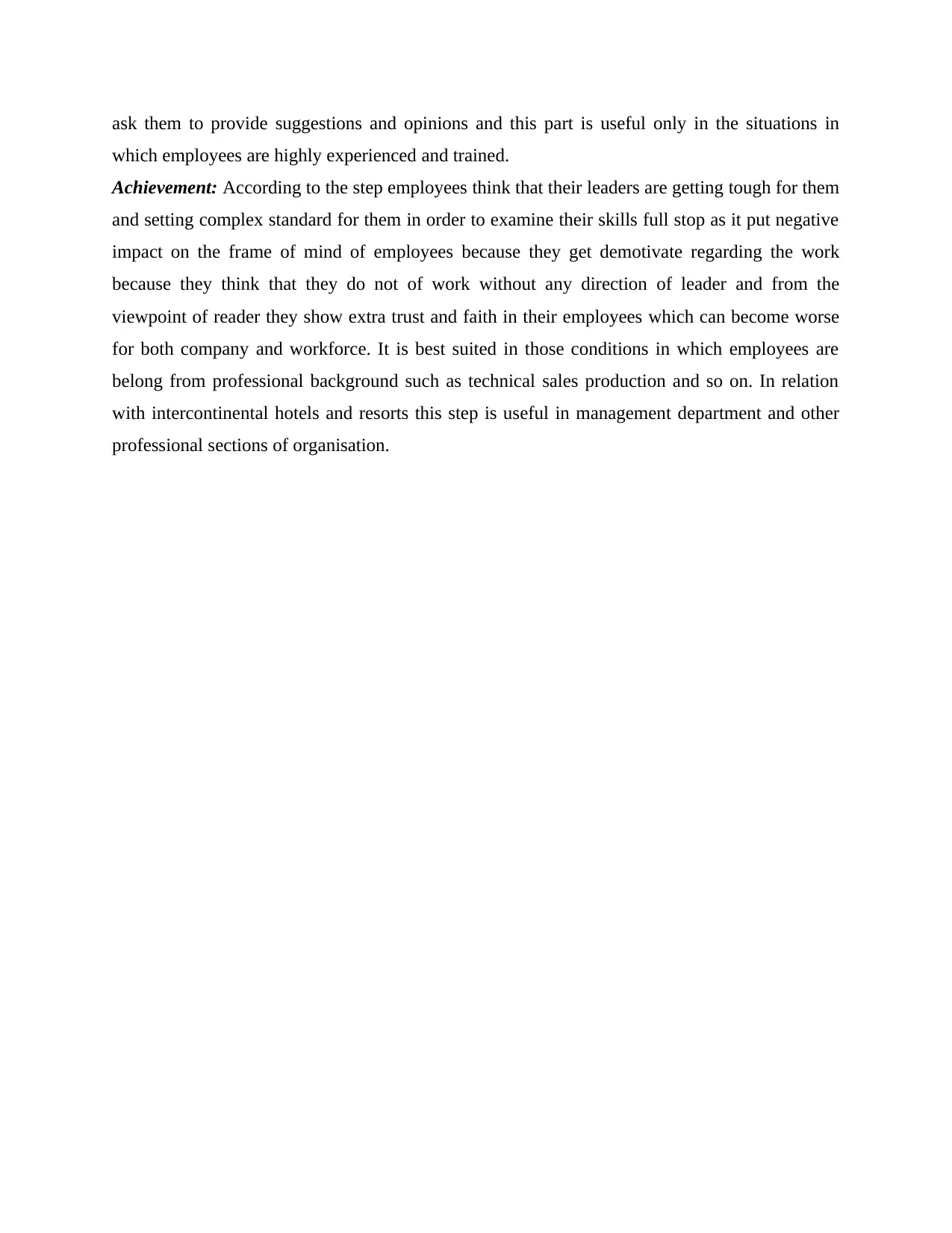
ask them to provide suggestions and opinions and this part is useful only in the situations in
which employees are highly experienced and trained.
Achievement: According to the step employees think that their leaders are getting tough for them
and setting complex standard for them in order to examine their skills full stop as it put negative
impact on the frame of mind of employees because they get demotivate regarding the work
because they think that they do not of work without any direction of leader and from the
viewpoint of reader they show extra trust and faith in their employees which can become worse
for both company and workforce. It is best suited in those conditions in which employees are
belong from professional background such as technical sales production and so on. In relation
with intercontinental hotels and resorts this step is useful in management department and other
professional sections of organisation.
which employees are highly experienced and trained.
Achievement: According to the step employees think that their leaders are getting tough for them
and setting complex standard for them in order to examine their skills full stop as it put negative
impact on the frame of mind of employees because they get demotivate regarding the work
because they think that they do not of work without any direction of leader and from the
viewpoint of reader they show extra trust and faith in their employees which can become worse
for both company and workforce. It is best suited in those conditions in which employees are
belong from professional background such as technical sales production and so on. In relation
with intercontinental hotels and resorts this step is useful in management department and other
professional sections of organisation.
⊘ This is a preview!⊘
Do you want full access?
Subscribe today to unlock all pages.

Trusted by 1+ million students worldwide
1 out of 14
Related Documents
Your All-in-One AI-Powered Toolkit for Academic Success.
+13062052269
info@desklib.com
Available 24*7 on WhatsApp / Email
![[object Object]](/_next/static/media/star-bottom.7253800d.svg)
Unlock your academic potential
Copyright © 2020–2026 A2Z Services. All Rights Reserved. Developed and managed by ZUCOL.





